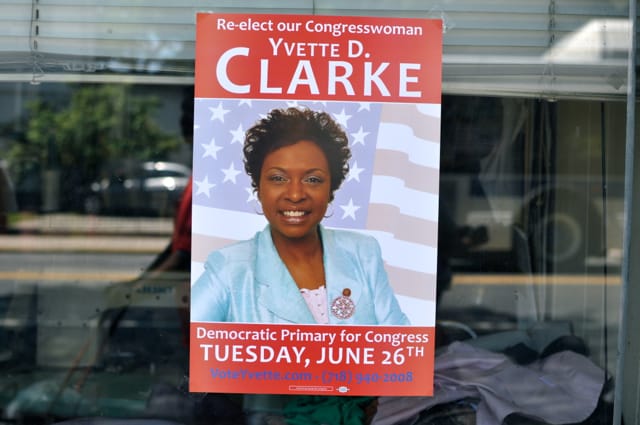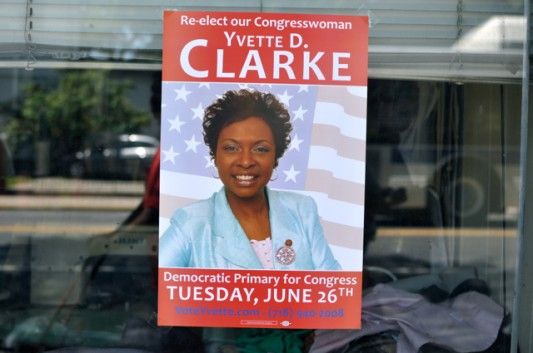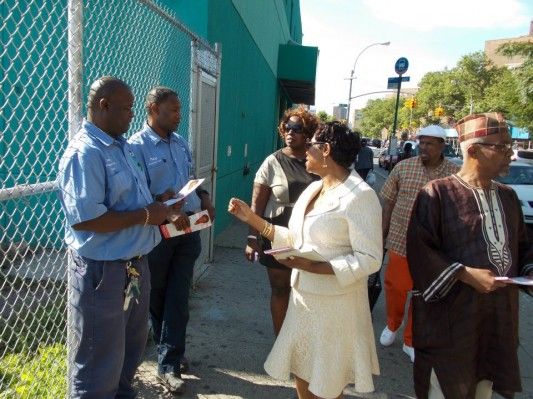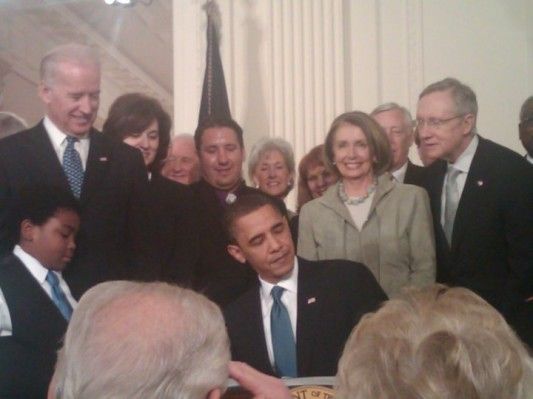Congresswoman Yvette Clarke Makes Her Case for Your Vote in the Primaries Next Week


“Out of sight is not out of mind,” said Congresswoman Yvette Clarke. “When I’m in Washington, I’m thinking about all of these communities that make up the 11th Congressional district, and the newly-formed 9th Congressional district, and I’m there because I have a job to do on their behalf, and I’ve not forgotten that.”
Clarke spoke with us recently about her campaign for her newly redrawn Congressional district, which puts most of our neighborhood into the 9th district. Addressing one of the main concerns we hear from you about her availability to our district, she wanted to stress that her district office, located at 123 Linden Blvd, is always open and available to her constituents, even in her absence.
“I don’t shy away from meetings with folks in the community, and I hope that they won’t shy away from making an invitation for them to meet with me as well,” she said.
Clarke explained that she’s in New York typically one day during the workweek–alternating Mondays and Fridays–and all weekends. She is open to attending community meetings on those weekdays, but if that’s not possible, she encourages individuals and organizations to set up a meeting with her at my district office. Contact Mary Bishop for scheduling at 718-287-1142 or mary.bishop@mail.house.gov.
As for issues on which she could intervene, Clarke said that though there’s limited access across legislative bodies, she would still be willing to help.
“We would have to work with the councilmen to make an impact,” she said. “Or we could write a letter directly to the Bloomberg administration.”
So if you’re in the district and you’ve got an issue you’d like to see resolved, that contact info above is the place to direct your thoughts.
Though redistricting has kept quite a large chunk of her previous district, the 9th stretches into areas that have some Republican leanings. But despite the fact that Republican Bob Turner won the 9th district seat after a special election following Anthony Weiner’s resignation, Clarke doesn’t believe there’s much of a chance of her district becoming a Republican stronghold.
“I don’t see that being a factor at the Congressional level,” she said. “There may be some who espouse those values, but overwhelmingly we’re talking about a progressive district.”
Even so, she’s doing all she can to get out and meet some of the people in these new parts of her area. During last week’s Congressional recess, Clarke said she met with various groups in the district, including Jewish leaders in southern Brooklyn, entrepreneurs at a meeting for a State Department initiative called Caribbean Idea Marketplace, congregations at over a half dozen church services, and a Muslim community group to address her concerns with the Islamaphobia that she’s seen and heard here and “in Washington in particular.”
“There are a host of new communities that have to be reached out to, have to be made aware of where our office is currently located and the kind of work we do there,” Clarke explained. “We need to get feedback about what have been the pressing issues in those particular communities that the federal government plays a role in.”
Born in Flatbush, Clarke said she’s grown up with a good sense for these different groups that she’s always been surrounded with.
“Many of them are communities that I’m familiar with just from being a life-long Brooklynite,” she said. “It’s Brooklyn, so it’s very easy to relate to.”

Clarke campaigning in Brooklyn, via Facebook.
As for her role, Clarke has represented the 11th district since first being elected in 2006, and in her time in Congress, she says she’s most proud of her work on behalf of small businesses.
“I’ve been a proponent of small business for most of my career, even outside of public service,” she said. “It’s because I really believe in the entrepreneurial spirit. It’s accessing opportunities as entrepreneurs that is the barrier to a number of communities across the nation. I’ve done a lot of advocacy around support for women- and minority-owned businesses, for access to contracting, access to capitol, and tax credits that help to ease any burdens that our small businesses may have as a result of the downturn in the economy.”
One thing that Clarke believes will help small businesses is letting the Bush-era tax cuts expire.
“That’s just a catalyst for a whole host of other things we need to do in order to get this economy going,” she said. “I have introduced legislation that provides a tax credit, mentoring, and other things to boost small business. That is something that would go into effect provided that the Bush tax cuts do expire.”
Citing high unemployment in many parts of our congressional district, Clarke believes this will help boost business, but acknowledges that more needs to be done, including training for low or unexperienced workers.
“There are many families living in misery, many living paycheck to paycheck, and they’re not seeing their way clear to the American Dream,” she said. “If we’re going to move this nation, I’ve got to start right here in my own constituency. I’ve got to get more training programs, maybe get BOCES or community colleges to go into some of what I call our distant and disenfranchised communities to help young people to get back into some sort of training, some sort of educational enhancement or enrichment. We’ve got to find ways to reengage them and get them reconnected. There are a couple of federal initiatives that I see as laboratories for new ways of community building, and I want to give some focus to that.”
Another issue she sees having a big impact on our district is immigration reform, which she says is a work in progress. [Note: this interview was conducted before President Obama’s recent immigration announcement.]
“Comprehensive immigration reform overall, for our entire nation, as is exemplified in the new and current district, would make a difference,” Clarke said. “We’re talking about people who want nothing but to make things right with the United States, and have remained loyal to our nation, have been doing all they can to make a positive contribution to the building of communities, but lack the status to give their full commitment to the nation just because of the barriers that are in place that prohibit it.
“Comprehensive immigration reform would be another way that we can move our civil society forward, a way in which we can appreciate the talent that immigrants bring to our nation,” she continued. “The fact that we’ve already invested in a significant number of individuals who are already here–they want every opportunity to make things right with the nation, and move forward with their lives for the sake of their children and their greater communities.”
Health care reform is also a big issue for Clarke, who said she’s waiting to see how the Supreme Court rules with baited breath.
“As this law takes effect, it’s been helping a whole host of families,” she said. “You can now as a woman go to see a doctor and not have your pregnancy for the purposes of insurance be designated as a pre-existing condition. I think that’s a quantum leap forward, to say the least. Parents being able to keep college students on their policy and longer, in this economy, that means a lot to the 9th and 11th Congressional districts. We’re just waiting to see what the Supreme Court comes out with, and we’ll take it from there.”

President Obama signing the health care reform law, via Facebook.
Speaking of health care, hospitals across New York City are facing all kinds of problems, which Clarke acknowledges is a major problem.
“It’s a state issue, but the implications for the entire community are tremendous,” she said. “To the extent that we can, we’ll try to leverage some federal support to keep from having all these institutions implode at once. Any one of these institutions going down will mean a tremendous hardship in the community as far as accessing healthcare and also employment, as so many people are employed by these institutions. Unfortunately, given the current climate in Washington, there’s not a whole lot that is being done, so I don’t know that if we pass a budget at the end of the day that can hep these institutions, but the administration may have something at their discretion that I can advocate for.”
Another issue Clarke said she’s working on is education, particularly the state of the public education system. A graduate of Ditmas Junior High and Edward R. Murrow High Schools, she says that one of the biggest changes she’s seen in this district is the change to the schools.
“When I look at the state of public education right now, particularly in my district, it’s not something that any of us can be proud of,” she said. “The public school system has become diminished in its capacity to educate the kids from the neighborhood. That’s a huge quality of life change that we really need to turn around, or we’re really going to regret it.”
Though she touts her time as a former member of the House Committee on Education and Labor, where she worked to to secure financing for college students, she admits that little has been done for younger students.
“We still haven’t passed a sane elementary/secondary education act, and that’s a bit disappointing,” she said. “There’s much more to be done. The list continues for education.”
One of the issues that’s also impacting young people that’s very personal to Clarke is the NYPD’s stop and frisk policy, and she joined the silent march last weekend while she was here on break.
“I have been out there over the past four years, when I realized that this was really becoming a problem,” she said, noting that in addition to worrying about the rights of her father and brother, she’s got got three nephews growing up in the city. She said the nephews have been stopped and frisked after coming out of those homes in Park Slope.
“I’ve got to stand up for them,” she said. “Initially you’re inclined to say stop and frisk is a tool that we need because if a crime is committed, you want the police to have a description and capture the individual who may have caused harm, so it’s a useful tool. But what we have here is a stretching of the definition. The fact that we have tolerated it for this long is disturbing. I don’t think there’s any other ethnic group, community, racial group, in this town that would have tolerated it for this long.”
In addition to her family, Clarke feels that she’s got a deep connection to the community. For instance, she recalled spending time at the Brooklyn Botanic Garden as a child, and said that’s one of the reasons she helped contribute to its new visitor center.
“When we were getting earmarks, which we don’t get anymore, that was one of the projects that I advocated for,” she said. “I’m really glad that I can give back in that way to the community, because I spent so many days in the garden.”
She said that giving back to the community that helped form her worldview is incredibly fulfilling.
“I feel very comfortable representing the constituency,” she said. “I’m more of a public servant more of a policy person, than I am a politician. I know that politics is a means to an end, and that’s the transactional part of the work that we do. For the most part, my goal is to help to make people’s lives a little bit better, and hopefully create some policies that will enable the next generation to do much better than what we’re doing right now. That’s a challenge.”
And in that challenge she’s got a challenger. In the Democratic primary election this Tuesday, June 26, Clarke is facing Sylvia Kinard, another Flatbush native. An attorney who has worked on with non-profit affordable housing projects and as the Senior Legislative Attorney for the New York City Council, Kinard told us recently that she feels Clarke has “been invisible.”
When asked about some of the differences she sees between the two candidates, Clarke said she doesn’t know Kinard well enough to make any comparisons. Based on a bio she said she read, Clarke didn’t seem impressed.
“I think that if there were some inclination toward public service, that would be something that I would be looking for in a candidate–someone who has served in some capacity, whether it’s non-profit or government,” she said. “I have a life-long resume of public service, so that I believe is a major distinction between the two of us.”
So if you’re a registered Democrat, be sure to get out an vote on Tuesday. Clarke’s final thoughts are to encourage everyone to cast a ballot in the primaries:
“It’s so important because it’s an indication of our understanding of the democratic process, and it sends a signal to those in Washington who have no problems with violating our civil rights and civil liberties, who want to turn back the hands of time when it comes to the concerns of this constituency, who have stood in the way of progress. It’s very important that people come out to vote, and I’m urging them to come out and vote for me. I hope that folks will see the work that I’ve done, and will appreciate that I’m doing it on their behalf.”



